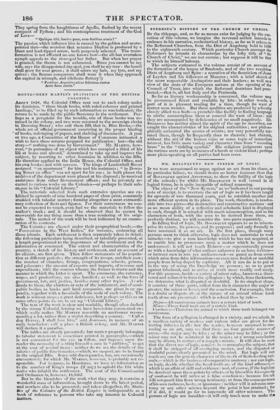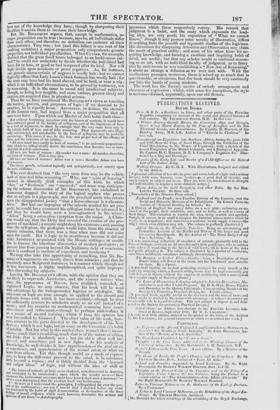MR. BOSANQUETS NEW SYSTEM OF LOGIC.
Jr we were accustomed to argue against an art from its abuse, or its particular fisilure, we should desire no better instance than that of BosasiousT against ARISTOTLE, to show the futility of the logic of the schools ; for whilst Mr. Bosallourr is well versed in all logical forms, he is quite incapable of refined reasoning. The object of the " New System," as we'indicated in our passing note of receipt, is to overturn the art of logic as it has been taught for upwards of two thousand years, and to establish another and more efficient system in its place. The work, therefore, is resolve- able into two parts—the destructive and constructive sections and as no mean ability of a reflective and scholastic kind is displayed in each, though it is mingled with much misconception, and as the characters of both, with the uses to be derived from them, are perfectly distinct, we will consider the two parts separately. In falling fbul of logic, Mr. llosAmwrr appears to us to miscon- ceive its nature, its powers, and its purposes ; and only formally to have mastered it as an art. In the first place, though many persons seem to think otherwise, logic does not undertake to work miracles—to give a man knowledge which he has not acquired, or to enable him to pronounce upon a matter which he does not understand: it will not teach Hebrew—or supernaturally possess us with a knowledge of what authors unknown to us have written— or instruct men in arts yet undiscovered—or guard us from errors which arise from false intbrination—or even save foolish or unskilful people from being duped by sophistry. All it can do is to put us in the way of using the knowledge we possess ; so as to guard against falsehood, and to arrive at truths more readily and surely. For this purpose, besides a variety of minor rules, ARISTOTLE disco- vered and reduced to forok the syllogism ; by which, from the known, we determine what is disputed or doubtful. In its simplest shape, it consists of three parts, called from their character the major or greater, the minor or lesser, and the conclusion. For example, there is a doubt or dispute about the nature of an animal whose fossil teeth alone are preserved : which is solved thus by rule-
JiTqjor—All carnivorous animals have a certain kind of teeth.
Ninor—Those fossil teeth are of' a certain kind.
Conctusivn—Thereflife the animal to which these teeth belonged was carilivorous.
The fbrin of a syllogism is changed in a variety, and we admit, in a needless variety of' modes; and various rules are given for de- tecting 11111acies in all : but the reader, however unversed in rea- soning as an art, may see that there are four generic sources of error,—the major may be fitlse ; or the minor may be false ; or the minor may not be contained ill the major; or a wrong conclusion may be drawn, in matters of a comply:: nature. It will also be seen that the direct use of logic, consist:; in so arranging the subject, that it shall be stripped of all overlaying matter, and the disputed or doubtful points clearly presented to the mind. But logic will not teach any one the generic character of the teeth of flesh-feeding am- ntals,—which is the business ofcomparative anatomy ; nor can logic, as logic, decide whether the tbssil teeth are of the kind affirmed,— which is an affhir of skill and evidence : and, of course, it' the logician be deceived upon these points by others, or by hitnselfin hi.s. comedy of anotwoist, he will arrive at a !lase conclusion ; because his art will not guard him from wrong testimony, (Sr from the consequences °fills own rashness, haste, or ignorance : neither will it advance ana- tomy or any other science beyond the point it has attained; for if it did, it would go for to supersede mill other sciences. Vic powers of logic are humbler—it will only teach men to make tit.
best use of the knowledge they have ; though by sharpening their faculties it assists them to increase their knowledge.
But Mr. BOSANQUET argues, that, except in mathematics, no major proposition call be true ; because, says he, all individuals differ from each other, and therefore no definition can embrace all their characteristics. Very true ; but (and this fallacy is one root of his vaulting ambition) a major proposition only comprehends generic properties, not individual peculiarities. When CUVIER, for example,
decided that the great fossil bones belonged to an herbivorous ani- mal,* he could not undertake to decide whether the individual had.
been fat or lean, or good or bad tempered after its kind. Nor will
logic decide upon accidents or prove negatives. As, for instance, one generic characteristic of negrocs is woolly hair : but we cannot logically affirm that Lady Laura's black footman has woolly hair ; for the man may have had his head shaved, and be bald, or wear a wig; which is an individual circumstance, to be proved by testimony, not by reasoning. It is the same in moral and intellectual subjects ; though, as being less tangible, and more various, greater nicety and caution are required than in physical science.
Thus far we have considered Mr. BOSANQUET'S views as touching the nature, powers, and purposes of logic : if we descend to its practice, he is equally loose. ARISTOTLE, to deduce the eternity of the human race, had argued from a major proposition that all men were born. Upon which our Master of Arts holds forth thus— But without burdening ourselves with the labour of analysis, it would have been sufficient proof of the futility of syllogism, and of the impotence of form oi a test of argument, to show by example that the very same form may the vehicle both of true and of false reasoning,. That arguments also illogi- cally constructed, and unreducible to the form of syllogism, mav be perliTtly convincing. This must, if any, be the true and proper test of the efficacy of form, and the criterion of its validity. "All men must necessarily be born of woman," is an universal proposition: from which we syllogistically derive the conclusion, that Socrates Ivas so born. And this is a true conclusion.
All men are born of woman : Alexander was a man: Alexander, therefore, MIS born of woman. This is true also.
All men are born of woman : Adam was a man : therefore Adam was born of a MUM).
Ike above proofs, estimated logically and syllogistically, rest exactly upon the same evidence.
Who ever doubted that " the very same form may be the vehicle both of' true and false reasoning '?" Why, our " seats of learning" abound in absurdly droll examples of this kind, by which "flats" or "freshmen " are " queered ;" and some wag, anticipat- ing the solemn discoveries of Mr. BOSANQUET, has embalmed in humorous doggrel the story of the logical nephew who proves that an eel-pie is a pigeon-pie, and the practical uncle who retorts upon the disappointed jockey " that a horse-chcsnut is a chesnut- hom." But had our impugner of the schools studied his art pro- perly, he would have examined his syllogism betbre be advanced it ; and then he would have seen a non-agreement in his minor ; " Adam" being a miraculous exception from the major. A Chris- tian would say that the Deity had receded the creation of the pro- genitor of mankind ; a sceptic might deny his existence ; and, passing from the syllogism' the geologists would infer, from the absence of organic remains, that there was a time when man did not exist upon the earth. But is logic to be overthrown because it did not make A HISTOTLE acquainted with the Mosaic writings ; or enable him to foresee the laborious discoveries of modern geologists ; or prevent him front passing beyond the legitimate field of conclusion, which is confined to matters of experience and testimony ? We may also take this opportunity of remarking, that Mr. Bo- witturr's arguments are mostly drawn front miracles ; and that he constantly uses Scriptural instances, in a manner which, though not in him Irreverent, is highly unphilosophical, and quite improper when discussing lay subjects. Leaving Mr. BOSANQUET'S efforts, with the opinion that they are not likely to supersede ARISTOTLE, and the various writers who, since the appearance Of BACON, have modified, extended, or explained Logic, we may observe that his book will be read with advantage by the well-grounded logician or ontologist. his criticisms on logic are true enough, as applied to the absurd and pedantic forms with which it has been overlaid,—though lie does not sufficiently censure its scholastic study as aim end instead of a means; and his remarks on mathematical reasoning have much shrewdness and refinement,—though he perhaps undervalues it LS a means of mental training ; whilst if' true, his opinion has been kaistallcd by Gintiox.f The chief value of his work, how- .ever, consists in the parts devoted to the development of his New System ; which is not logic, but an essay on the formation (la habit oiijudging. Not but what in this section there is much that is incon- clusive, much that is twaddling, much that is of the nature of ethics, and little that is absolutely new ; but the old is often well im- pres,ed, and sometimes put in new lights. In his analysis of Knowledge, he well divides it into apprehension of the lirct lob at, or experience and apprehension of' the second intent, or wind WC learn ilmn others. Yet this, though usefid as a mode of' expres- sion, to keep the difference present to the mind, is in substance little beyond a truism ; and is thinly divided from the " learned and vulgar ideas" of logic, and without the idea of skill or * The bones of animals, as large as an elephant, were discovered in America, fuld concluded to be carnivorous ; upon which. the MOBiler arose—. I low enormous the herbivorous creatures must have been to feed such a monster !"— till (71:vitat determined that the creature itself was herbivorous. t " As soon as I understood the principles, I relinquished for ever the pur- gait t■f the mathematics : nor can 1 lament that 1 desisted before my ntind mu hardened by the habit of rigid demonstration so destructive of the finer feelings of moral evidence, which must, however, determine the actions and opinions of our lives."--Autobiography. ignorance which these respectively convey. His remark that judgment is a habit, and the essay which expounds the lead- ing idea, are very good; his exposition of " What we cannot Know," though it may possess some novelty of illustration, differs in nothing from the possible and impossible studies of the logicians. Ills directions for sharpening Attention and Observation may claim the merit of practical utility ; and some of his other hints for ac- quiring knowledge, and forming a cautious and inquiring habit of mind, are useful ; but that any scholar would so confound reason- ing as an art, with an individual faculty of judgment, as to fancy that by such means he was establishing a " New Art of Reasoning," is about as strange a delusion as we ever met with. With the meritorious passages, moreover, there is mixed up so much that is questionable, or erroneous, that the book should be very cautiously Put into the bands of' young students.
The work hums the literary merits of orderly arrangement and clearness of expression ; whilst, with some few exceptions, the style is nervous—formed, apparently, upon our old divines.



























 Previous page
Previous page